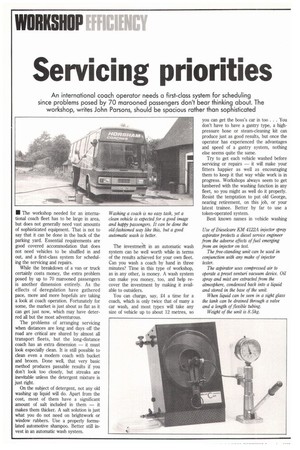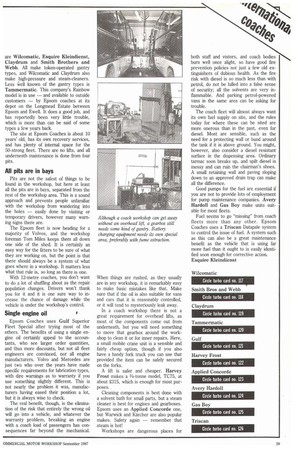Servicing priorities
Page 96

Page 97

If you've noticed an error in this article please click here to report it so we can fix it.
An international coach operator needs a first-class system for scheduling since problems posed by 70 marooned passengers don't bear thinking about. The workshop, writes John Parsons, should be spacious rather than sophisticated
• The workshop needed for an international coach fleet has to be large in area, but does not generally need vast amounts of sophisticated equipment. That is not to say that it can be done in the back of the parking yard. Essential requirements are good covered accommodation that does not need vehicles to be shuffled in and out, and a first-class system for scheduling the servicing and repairs.
While the breakdown of a van or truck certainly costs money, the extra problem posed by up to 70 marooned passengers is another dimension entirely. As the effects of deregulation have gathered pace, more and more hopefuls are taking a look at coach operation. Fortunately for some, the market is just about as flat as it can get just now, which may have deterred all but the most adventurous.
The problems of arranging servicing when distances are long and days off the road are critical are shared by almost all transport fleets, but the long-distance coach has an extra dimension — it must look especially clean. It is still possible to clean even a modern coach with bucket and broom. Done well, that very basic method produces passable results if you don't look too closely, but streaks are inevitable unless the detergent mixture is just right.
On the subject of detergent, not any old washing up liquid will do. Apart from the cost, most of them have a significant amount of salt included in them — it makes them thicker. A salt solution is just what you do not need on brightwork or window rubbers. Use a properly formulated automotive shampoo. Better still invest in an automatic wash system. The investment in an automatic wash system can be well worth while in terms of the results achieved for your own fleet. Can you wash a coach by hand in three minutes? Time in this type of workshop, as in any other, is money. A wash system can make you money, too, and help recover the investment by making it available to outsiders.
You can charge, say, 24 a time for a coach, which is only twice that of many a car wash, and most types will take any size of vehicle up to about 12 metres, so you can get the boss's car in too . . You don't have to have a gantry type, a highpressure hose or steam-cleaning kit can produce just as good results, but once the operator has experienced the advantages and speed of a gantry system, nothing else seems quite the same.
Try to get each vehicle washed before servicing or repairs — it will make your fitters happier as well as encouraging them to keep it that way while work is in progress. Workshops always seem to get lumbered with the washing function in any fleet, so you might as well do it properly. Resist the temptation to put old George, nearing retirement, on this job, or your latest trainee. Better by far to use a token-operated system.
Best known names in vehicle washing Use of Dieselcare KM 4122A injector spray aspirator protects a diesel service engineer from the adverse effects of fuel emerging from an injector on test.
The free-standing unit can be used in conjunction with any make of injector tester.
The aspirator uses compressed air to operate a preset venturi vacuum device. Oil spray and mist are extracted from the atmosphere, condensed back into a liquid and stored in the base of the unit.
When liquid can be seen in a sight glass the tank can be drained through a valve and a length of flexible tubing.
Weight of the unit is 8.5kg. are Wilcomatic, Esquire Kleindienst, Claydrum and Smith Brothers and Webb. All make token-operated gantry types, and Wilcomatic and Claydrum also make high-pressure and steam-cleaners. Less well known of the gantry types is Tarnmermatic. This company's Rainbow model is in use — and available to outside customers — by Epsom coaches at its depot on the Longmead Estate between Epsom and Ewell. It does a good job, and has reportedly been very little trouble, which is more than can be said of some types a few years back.
The site at Epsom Coaches is about 10 years' old, has its own recovery services, and has plenty of internal space for the 50-strong fleet. There are no lifts, and all underneath maintenance is done from four pits.
All pits are in bays
Pits are not the safest of things to be found in the workshop, but here at least all the pits are in bays, separated from the rest of the workshop area. This is a sound approach and prevents people unfamiliar with the workshop from wandering into the holes — easily done by visiting or temporary drivers, however many warning signs there are.
The Epsom fleet is now heading for a majority of Volvos, and the workshop foreman Tom Miles keeps them all down one side of the shed. It is certainly an easy way for the fitters to be sure of what they are working on, but the point is that there should always be a system of what goes where in a workshop. It matters less what that rule is, so long as there is one.
With 12-metre coaches, you don't want to do a lot of shuffling about as the repair population changes. Drivers won't thank you for it and it is one sure way to increase the chance of damage while the vehicle is under the workshop's control.
Single engine oil
Epsom Coaches uses Gulf Superior Fleet Special after trying most of the others. The benefits of using a single engine oil certainly appeal to the accountants, who see larger order quantities, and thus more discounts, but not all fleet engineers are convinced, nor all engine manufacturers. Volvo and Mercedes are just two who over the years have made specific requirements for lubrication types, with dire warnings as to warranty if you use something slightly different. This is not nearly the problem it was, manufacturers having eased their position a lot, but it is always wise to check.
The real benefit, though, is the elimination of the risk that entirely the wrong oil will go into a vehicle, and whatever the warranty problem, breaking an engine with a coach load of passengers has consequences far beyond the mechanical.
When things are rushed, as they usually are in any workshop, it is remarkably easy to make basic mistakes like that. Make sure that if the oil is also suitable for vans and cars that it is reasonably controlled, or it will tend to mysteriously leak away.
In a coach workshop there is not a great requirement for overhead lifts, as most of the components come out from underneath, but you will need something to move that gearbox around the workshop to clean it or for inner repairs. Here, a small mobile crane unit is a sensible and fairly cheap option, though if you also have a handy fork truck you can use that provided the item can be safely secured on the forks.
A lift is safer and cheaper. Harvey Frost makes a 3/4-tonne model, TC75, at about £315, which is enough for most purposes.
Cleaning components is best done with a solvent bath for small parts, but a steam cleaner is best for engines and gearboxes. Epsom uses an Applied Concorde one, but Warwick and Karcher are also popular makes. Safety again — remember that .steam is hot!
Workshops are dangerous places for both staff and vistors, and coach bodies burn well once alight, so have good fire prevention policies not just a few old extinguishers of dubious health. As the fire risk with diesel is so much less than with petrol, do not be lulled into a false sense of security; all the solvents are very inflammable. And parking petrol-powered vans in the same area can be asking for trouble.
The coach fleet will almost always want its own fuel supply on site, and the rules today for where these can be sited are more onerous than in the past, even for diesel. Most are sensible, such as the need for a protecting wall or bund around the tank if it is above ground. You might, however, also consider a diesel resistant surface in the dispensing area. Ordinary tarmac soon breaks up, and spilt diesel is messy and can ruin the chairman's shoes. A small retaining wall and paving sloping down to an approved drain trap can make all the difference.
Good pumps for the fuel are essential if you are not to provide lots of employment for pump maintenance companies. Avery Hardoll and Gas Boy make units suitable for most fleets.
Fuel seems to go "missing" from coach fleets more than any other. Epsom Coaches uses a Triscan Datapale system to control the issue of fuel. A system such as this can also be a great maintenance benefit as the vehicle that is using far more fuel than it ought to is easily identified soon enough for corrective action. Esquire Kleindienst








































































































